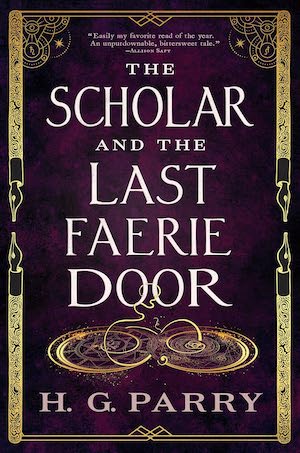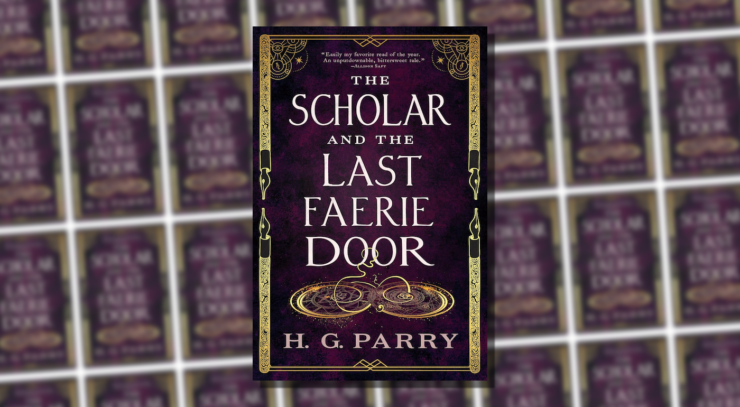When a writer creates a fictional world that is our world with the addition of magic, questions arise. If there is and has always been magic, how does that change art? What would poets write about? Wouldn’t cities be different? Wouldn’t history be different?
Writers have considered—or avoided— these questions in a variety of ways, but the way in which H.G. Parry handles them in her new novel, The Scholar and the Last Faerie Door, makes a whole lot of sense to me. Sure, there’s magic. But only the very wealthiest families have access to it, and they keep it secret, safe for themselves alone.
Mostly.
The scholar of Parry’s title is most definitely not from one of those fancy magical families with their hyphenated names and sprawling manors. Clover Hill is the second-eldest child in a farming family in 1920 Lancashire. She wants adventure, and to see more of the world, but the best she can hope for is to train as a teacher. When her elder brother, Matthew, wants to go fight in WWI, she helps convince their mother to let him go. His return, years later, changes everything for his family. Someone used magic on the battlefield and opened a door to faerie, and something very nasty came through. Many men died. Matthew barely survived its attack, and he is not the same.
Clover, clever and ambitious, latches on to the idea of magic and through intense studying—and the help of her neighbor, Lady Anjali Winter, whose library is quite useful to a would-be witch—earns her way to Camford, a hidden magical university entered through secret doors in Cambridge or Oxford. No one knows where Camford actually is, though a reader may begin to formulate some theories pretty quickly. There, Clover is an outsider, a scholarship witch without money, confidence, or years of magical training. (She’s also a woman, of which Camford admits precious few.) Magical families are just better at magic, see. It comes to them so much more easily. People tell her this regularly, but Clover is stubborn, and smart, and will learn the secrets of magic—and so much more.
But Parry doesn’t begin with any of this; she begins with a beautiful young man asking Clover, in the Camford library, what she’s reading. Alden Lennox-Fontaine is the shiniest of the shiny rich kids, and when he becomes quite interested in the dated reading Clover is doing, it is the beginning of a beautiful, if lopsided, friendship. Alden is friends with glamorous Hero Hartley and quiet, gentle Eddie Gaskell, and despite Clover’s outsider status they become an inseparable quartet for a whole school year. After that, and a summer trip to Alden’s family home, their relationships change quite drastically, and so does Parry’s books, which skips ahead to the end of school.
At first, this feels like a terrible loss: I wanted to hang out at magic school! But Parry is a canny writer, and she builds her plot slyly and slowly, in the books these magic college kids read, the magical subjects in which they are interested, the way the rest of the world does and doesn’t intrude. I cannot speak to the accuracy of her post-WWI England, being neither a scholar nor a Brit, but the existence of the war, the fact that it just ended and left everyone changed, hangs like a cloud over everyone but the very wealthy. Clover’s awareness of class is constant, and her narration—which comes to us from some time in her future—is calm and clear-eyed as she details what she and her friends did, and the unexpected things that resulted.
I’ve been talking about the scholar in Parry’s title, but not yet about that faerie door. Parry’s faeries are particularly prickly and wild in a way that drifts far from the more currently common fae courts, fancy dresses, and regal bearing. The one that cursed Matthew left him with a bark-covered shoulder that would have killed him had a magical friend not intervened. In the wake of that attack, the magical government banned faerie magic and sealed all the doors to faerie. But there are always people who think the rules don’t apply to them, aren’t there? People whose faerie doors are the result of their own desires and pain and tireless wishes.
Clover, though smart and kind, is also very far from home, and one thing that Parry makes immediately palpable about her is her loneliness at school. Alden and Hero are alluring, glamorous, and while Eddie is not quite that, Eddie is quietly kind and wonderful to be around. But it is Alden who has the chemistry, Alden who has a secret, and Alden who gradually, almost languidly, begins to show his true colors.
Buy the Book


The Scholar and the Last Faerie Door
The Scholar and the Last Faerie Door is immensely readable, an immersive experience in both magic and lore and the richly drawn, tangled relationships among Clover and her fancier friends. Everyone is understandable, if not always sympathetic, but Parry is very interested in fallibility, and mistakes, and the real repercussions that can come from a certain kind of obliviousness, whether wilful or studied.
In some ways this novel is a really lovely character study. And in others, it’s a clear-as-a-bell takedown of power, colonialism, and a country’s refusal to dismantle the flawed, cruel systems on which its world and power structures have been built. Like so many good fantasies, it is in part a story about the stories people tell about themselves. The magical families tell a story about how they just happen to be so good at magic; that’s just how it is, and they mustn’t make it public. A curious outsider making her way into the heart of England’s magical royalty brings with her a different sort of narrative. She believes hard work can put her on their level, magically, at least. But maybe neither of these stories is true.
The first half of The Scholar and the Last Faerie Door is a magic-school story; the second half picks apart, brick by brick, everything about the world Clover fights her way into. It’s tense, full of betrayals, and comes with one twist on which I was not entirely sold (though it does, to be fair, add some extra emotional resonance to an already dramatic plot). It flips some familiar narratives (a nod to “Tam Lin” is especially delicious), and briefly but effectively nods to England’s reach across the world (the immigrant Lady Winter is a fantastic secondary character). A massive and stunning oak tree and an angry dryad are both central figures, weaving the oft-ignored natural world into these scholars’ modern lives.
I would not want to assume that Parry had a specific existing narrative in mind when she wrote this book, but it is, at this moment in time, hard not to read it, at least in part, as a rejoinder to a certain other magic-school series in which no one ever really asks any questions about existing power structures or what terrible secrets the magical world might have built into its very foundations. There are no cartoonishly evil villains here, no wicked murderers; there are simply fallible, selfish, heartbroken people who are willing to go to great lengths to get back what they lost. A person might be reminded of Holly Black’s dark faerie books, or Babel, or The Magicians, or Jonathan Strange, though if you are tempted to think “dark academia,” I don’t think this fits that bill. There’s a gentleness to the proceedings, a sense of loss and awareness that comes from Clover’s looking-back perspective. You don’t change the world without regretting a few things along the way.
The Scholar and the Last Faerie Door is published by Redhook.










